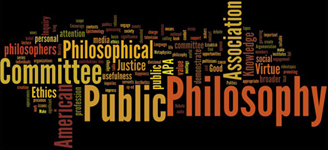Activities
Serving its charge, the committee engages in a number of activities concerning public philosophy. The set of links immediately below these words is a list of the sections of activities listed on this page.
Events: Upcoming, Past
Conceptualizing Public Philosophy: Member efforts, Learning from other fields
Online Tools: Social networking, APA tools
 Events
Events
The committee has and will continue to organize events that occur simultaneously with the American Philosophical Association's divisional meetings. Where fruitful collaborations look promising, the committee may work together with partnering organizations and events in the future. The following are events that have already occurred as well as a few upcoming programs.
![]()
Upcoming Events and Opportunities
![]()
CPP Panels at the Central and Pacific APA Meetings in 2014
The Committee on Public Philosophy regularly sponsors panels at the APA's divisional meetings. The next panel will be at the Pacific APA in 2014.
2014 Pacific APA panel
"Cultivating Citizenship: Student-Initiated Civic Engagement Projects"
Susan Hawthorne (St. Catherine University)
Ramona Ilea (Pacific University)
Monica Janzen (Hennepin Technical College)
Cody Flaherty, student (St. Catherine University)
Chair: Monica Janzen
![]()
Past Events
![]()
2014
![]()
2014 Central APA panel
"Promoting Religious Tolerance in the 21st Century: Practical Perspectives from Philosophers of the Past & the Present"
Edwin Curley, University of Michigan (Philosophy)
Nicholas Wolterstorff, Yale University (Divinity School)
Robert Audi, University of Notre Dame (Philosophy)
Cristina Lafont, Northwestern University (Philosophy)
Chair: Jeanine Diller (University of Toledo)

WEB DISCUSSION IN ADVANCE OF THE PANEL! For this panel, the organizers have put together an online discussion forum hosted on our Web site so that panelists and others can begin our discussion in advance of the meeting and so that the discussions are publicly available online. This is an experiment which we hope people will participate in and spread the word about. Visit the discussion page here.
![]()
2013
![]()
 2012 Public Philosophy Op-ed Contest (decided in 2013)
2012 Public Philosophy Op-ed Contest (decided in 2013)
The APA Committee on Public Philosophy is pleased to announce the winners of the 2012 op-ed essay contest. In 2013, The contest subcommittee reviewed nominated pieces published in 2012. The goal of this contest was to honor 5 standout pieces that blend successfully philosophical argumentation with an Op-Ed writing style. Winning submissions call public attention directly or indirectly to the value of philosophical thinking. The pieces were judged in terms of their success as examples of public philosophy: being accessible to the general public, focused on important topics of public concern, and characterized by sound reasoning. The authors of winning articles are awarded $100 (total for each piece) and were recognized in a formal announcement from the APA Committee on Public Philosophy in 2013 at the Eastern Division meeting.
Dr. Kyle Powys Whyte, who has since rolled off the CPP generously continued for the end of this contest to chair the subcommittee effort.
The winning authors and pieces were:
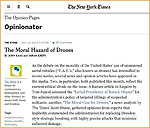 Amy R. Allen, "'Mommy Wars' Redux: A False Conflict"
Amy R. Allen, "'Mommy Wars' Redux: A False Conflict"
Yuval Eylon, "Ignoring the Most Promising Option"
John Kaag and Sarah Kreps, "The Moral Hazard of Drones"
Michael Lynch, "A Vote for Reason"
Jeff McMahan, "Why Gun 'Control' Is Not Enough"
Congratulations to these authors! It is also encouraging to see the many excellent submissions from which these pieces were selected.
![]()
 2013 Public Philosophy Network conference
2013 Public Philosophy Network conference
The Public Philosophy Network (PPN), an organization dedicated to the support of publicly engaged philosophical teaching, research, and social action projects, is holding its second conference on March 14-16, 2013 at the Emory University Conference Center. The deadline for paper and workshop proposals has passed--but it is not too late to geton the program! Click here (http://publicphilosophynetwork.ning.com/page/public-phil-conference) for more information and to register for the conference and sign-up for workshops. Registrants who sign-up before January 15th will be listed in the conference program as discussants. Workshop sign-up is on a first come, first served basis, so register early!
![]()
Panel:
We hosted a well attended and enlightening panel at the 2013 Eastern APA meeting. The topic and participants were:
“Public Digital Scholarship: What Philosophy Can Look Like in a Digital Age”
Chris Long (Pennsylvania State University), “The Public Philosophy Journal”
Jackie Kegley (California State University Bakersfield), “Digital Philosophy - Engaging in Counter Epistemology by
Reducing Ignorance”
George Aulisio (University of Scranton), “The Public Philosophy Network”
John Corvino (Wayne State University), “The Gay Moralist”
Chair: Eric Thomas Weber (University of Mississippi)
![]()
2012
![]()
Book Signing:
At the December 2012 Eastern Division meeting of the American Philosophical Association in Atlanta, GA, the Committee on Public Philosophy hosted a book signing event on December 29, 2012, from 2-4 PM in Imperial Ballroom B at the Marriott Marquis in Atlanta, GA.
 Five philosophers participated and have written books that show the impact of philosophy on public life. They included
Five philosophers participated and have written books that show the impact of philosophy on public life. They included
John Lachs, Stoic Pragmatism
Jeremy Wisnewski (with R.D. Emerick), The Ethics of Torture (unable to attend)
John Shook, The God Debates
Carlin Romano, America the Philosophical
Robert Talisse, Democracy and Moral Conflict.
Each author said a few words about writing for the public about pressing philosophical matters and then met visitors and signed books available for purchase (cash or check). You can also read our initial press release about this event here, which includes a brief summary of each book.
![]()
Panel:
At the December 2012 meeting of the Eastern Division of the American Philosophical Association in Atlanta, GA, the committee sponsored a panel and a book signing event:
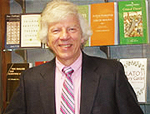 The panel featured the work of Dr. Jim Sterba of the University of Notre Dame, beginning with two scholars who offered comments on Dr. Sterba's work, followed by his response. Dr. Eric Thomas Weber chaired the session. The panel details in brief were the following:
The panel featured the work of Dr. Jim Sterba of the University of Notre Dame, beginning with two scholars who offered comments on Dr. Sterba's work, followed by his response. Dr. Eric Thomas Weber chaired the session. The panel details in brief were the following:
"Can Moral and Political Philosophy Really Provide a Foundation for Public Policy or is it Question-Begging All Around? A Panel on Jim Sterba’s Work"
Sunday, December 30th, 9:00-11:00 a.m., Session VI-J, Room TBA @ the conference
David Cummiskey (Bates College)
John Lachs (Vanderbilt University)
James Sterba (University of Notre Dame)
Moderator: Eric Thomas Weber (University of Mississippi)
![]()
2011 Public Philosophy Op-Ed Contest
The Committee on Public Philosophy organized the 2011 Public Philosophy Op-Ed Contest. Click here for the PDF of the official announcement and submission guidelines from our 2012 contest to review pieces published in 2011. The committee received and reviewed 23 pieces and selected 5 outstanding submission for special recognition.
2011 winners:
James Stacey Taylor
“Want to Save Lives? Allow Bone Marrow Donors to be Paid”
Los Angeles Times
David Kyle Johnson
“Watson in Philosophical Jeopardy”
Psychology Today
José-Antonio Orosco
“Tuition Bill the Decent Option”
Corvallis Gazette-Times
Louise M. Antony
“Goodness Minus God”
New York Times
Todd Edwin Jones
“Budgetary Hemlock”
Boston Review
The APA Committee on Public Philosophy is pleased to announce these winners for the contest. Our goal was to honor 5 outstanding pieces that blend successfully philosophical argumentation with an Op-Ed writing style. Winning submissions called public attention directly or indirectly to the value of philosophical thinking. The pieces were judged in terms of their success as examples of public philosophy: being accessible to the general public, concerned with important topics of public concern, and characterized by clear reasoning. The winning authors are recognized on the APA Web site and on this site, and will be named at an Eastern APA panel meeting announcing a number of award winners for various APA prizes and awards.
Award Amount: $100 per winner
![]()
Next, at the Central APA in 2012, held on February 15-18, 2012, at the Palmer House Hilton in Chicago, IL, the committee sponsored a panel organized by committee member Dr. Owen Anderson.
 The panel was titled “Is there hope? Has Philosophy Contributed to Progress?” Dr. Owen Anderson chaired the session. The participants and presentations included:
The panel was titled “Is there hope? Has Philosophy Contributed to Progress?” Dr. Owen Anderson chaired the session. The participants and presentations included:
Dr. Robyn Gaier (Viterbo University)
“Grief’s Pain and Wisdom’s Love: A Lesson on Philosophy and Progress from ‘Self-Reliance’”
Dr. Mark Tschaepe (University of Minnesota, Rochester)
“Hypothetical to Technical: Philosophy's Unheralded Contribution to Making Useful Tools”
Dr. Shane Ralston (Pennsylvania State University, Hazelton)
“Hope, Growth and Progress: Three Cornerstones of Pragmatism”
Dr. Owen Anderson (Arizona State University)
“On Hope and Philosophical Progress”
![]()
2011
![]()
At the December 2011 meeting of the Eastern Division of the American Philosophical Association in Washington, D.C., the committee sponsored two panels:
 The first panel was titled “Professional Philosophical Bloggers.” Dr. Andrew Light, Professor at George Mason University and Senior Fellow at the Center for American Progress, chaired the session. The panel was hosted on Thursday, December 29th from 1:30 - 4:30 pm. The panel presenters included:
The first panel was titled “Professional Philosophical Bloggers.” Dr. Andrew Light, Professor at George Mason University and Senior Fellow at the Center for American Progress, chaired the session. The panel was hosted on Thursday, December 29th from 1:30 - 4:30 pm. The panel presenters included:
David Roberts (Grist)
Matthew Yglesias (Slate)
Andrew Sullivan (The Daily Beast)
Andrew Light (George Mason University, Center for American Progress)
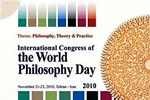 The second panel was titled "The Limits of Engagement?: World Philosophy Day in Tehran, 2010." Garry Hagberg of Bard College served as our chair for the session. This panel was co-sponsored by the Committee on Public Philosophy and the Committee on International Cooperation. The session was conversational, covering the controversy that arose over the World Philosophy Day that was planned to occur in Tehran in 2010. The panel presenters included:
The second panel was titled "The Limits of Engagement?: World Philosophy Day in Tehran, 2010." Garry Hagberg of Bard College served as our chair for the session. This panel was co-sponsored by the Committee on Public Philosophy and the Committee on International Cooperation. The session was conversational, covering the controversy that arose over the World Philosophy Day that was planned to occur in Tehran in 2010. The panel presenters included:
William McBride (Purdue University)
Eric Thomas Weber (The University of Mississippi)
Carlin Romano (Ursinus College, The Chronicle of Higher Education)
![]()
 In October of 2011, the Public Philosophy Network hosted a conference called "Advancing Public Philosophy." Former committee member Dr. Sharon Meagher was among the several organizers of the event, which took place on October 6-8, 2011 at the Washington Plaza Hotel, Washington, D.C. The event was co-sponsored by the American Philosophical Association, George Mason University’s Institute for Philosophy and Public Policy, Michigan State University’s Kellogg Chair of Agricultural Ethics, and Pennsylvania State’s Rock Ethics Institute. The organizers issued a call for proposals / call for papers, which you can read as an Adobe PDF file here. The deadline for submitting a proposal passed on April 30th, 2011. You can learn more about the PPN on the organization's Web site here.
In October of 2011, the Public Philosophy Network hosted a conference called "Advancing Public Philosophy." Former committee member Dr. Sharon Meagher was among the several organizers of the event, which took place on October 6-8, 2011 at the Washington Plaza Hotel, Washington, D.C. The event was co-sponsored by the American Philosophical Association, George Mason University’s Institute for Philosophy and Public Policy, Michigan State University’s Kellogg Chair of Agricultural Ethics, and Pennsylvania State’s Rock Ethics Institute. The organizers issued a call for proposals / call for papers, which you can read as an Adobe PDF file here. The deadline for submitting a proposal passed on April 30th, 2011. You can learn more about the PPN on the organization's Web site here.
![]()
 At the 2011 Central Division meeting of the American Philosophical Association, we hosted a panel titled "Public Philosophy and Public
Rationality: Solving Public Problems through Philosophical Discussion?" Dr. Owen Anderson (Arizona State University) will chair the panel. The session information is the following:
At the 2011 Central Division meeting of the American Philosophical Association, we hosted a panel titled "Public Philosophy and Public
Rationality: Solving Public Problems through Philosophical Discussion?" Dr. Owen Anderson (Arizona State University) will chair the panel. The session information is the following:
Thursday, March 31, 2011, 2:20-5:20 p.m., Session II-M,
Mark Brouwer (Wabash College)
Stephen Webb (Wabash College)
Surrendra Gangadean (Paradise Valley Community College)
 Next, at the 2011 Pacific Division meeting of the APA in San Diego, Dr. Thomas M. Powers, of the University of Delaware and CPP Committee member, chaired a panel titled "Philosophical Collaboration: Theoretical and Practical Considerations." The speakers for this panel were:
Next, at the 2011 Pacific Division meeting of the APA in San Diego, Dr. Thomas M. Powers, of the University of Delaware and CPP Committee member, chaired a panel titled "Philosophical Collaboration: Theoretical and Practical Considerations." The speakers for this panel were:
Friday, April 22, 2011, 1-4 p.m., Session 7M
Melinda Bonnie Fagan (Rice University): “Collaboration and Experiment in Studies of Biomedicine”
Thomas M. Powers (University of Delaware): “Fabrics of Science: Quine and the Possibility of Collaboration”
Mark Greene (University of Delaware): “Teaching Research Ethics Across Disciplines”
Fritz Allhoff (Western Michigan University): “Technology, Ethics and Interdisciplinarity”
Paul Humphreys (University of Virginia): “The Solitary Philosopher and the Cooperating Scientist”
Darrel Moellendorf (San Diego State University): "What Political Philosophers can Learn from Climate Scientists."
![]()
Finally, also at the 2011 Pacific Division meeting of the APA, Noëlle McAfee (Emory University) chaired a committee session titled "Philosophy Undisciplined: A Broader Vision of Accountability." Beyond the chair, the panel presenters included:
Thursday, April 21, 2011, 1-4 p.m., Session is 4-K
Ann J. Cahill (Elon University) “A Theory of the Undisciplined”
Robert Frodeman (University of North Texas) J. Britt Holbrook (University of North Texas) “Philosopher Kings and Philosopher Bureaucrats: The Public Sector’s Need for Philosophy”
Stephen Bloch-Schulman (Elon University) “Undisciplining the Undergraduate Experience”
![]()
2010
At the December 2010 meeting of the Eastern Division of the American Philosophical Association, the committee offered two panels.
![]()
 The first 2010 Eastern APA panel was the subject of securing public grant funding for work in philosophy. The panel included a representative from the National Endowment for the Humanities, one from the National Science Foundation, and a scholar and CPP member, Dr. Kyle Whyte, who has experience working on such grants. Dr. Eric Thomas Weber chaired this panel. The panel make up was slotted to be:
The first 2010 Eastern APA panel was the subject of securing public grant funding for work in philosophy. The panel included a representative from the National Endowment for the Humanities, one from the National Science Foundation, and a scholar and CPP member, Dr. Kyle Whyte, who has experience working on such grants. Dr. Eric Thomas Weber chaired this panel. The panel make up was slotted to be:
Jason Bofetti (National Endowment for the Humanities): “Grant Opportunities at the NEH”
Fred Kronz (National Science Foundation): “Funding Opportunities for Philosophers at the NSF”
Kyle Powys Whyte and Paul Thompson (both of Michigan State University): “On Collaborative Grants: Ethics, Science, and Public Policy”
![]()
 The second panel was on "Philosophy and the Media." This session addressed the ways in which philosophers can frame their work for press releases to the media and gain attention for their projects from people outside of the field of philosophy. Dr. Andy Lamey chaired this panel. The speakers and their presentations were slotted to be:
The second panel was on "Philosophy and the Media." This session addressed the ways in which philosophers can frame their work for press releases to the media and gain attention for their projects from people outside of the field of philosophy. Dr. Andy Lamey chaired this panel. The speakers and their presentations were slotted to be:
Christopher Shea: "What Makes a Good Philosophy Story?"
Anastasia Friel Gutting: "Philo-zine: Notre Dame Philosophical Reviews Past and Future"
Julian Baggini: "Fast and Loose? Integrity with a Broad Brush"
Gary Gutting: "Socrates in the Virtual Agora: Reflections on The Stone"
Andy Lamey: "Generating Media Interest in Philosophy - Suggestions for Researchers and Conference Organizers"
Due to some travel difficulties, Eric Thomas Weber filled in to give a presentation on philosophical writing for wider audiences. His presentation was titled "Public Philosophy and the Benefits of Media Engagement."
![]()
In April of 2010, Dr. Sharon Meagher, former committee member, and Dr. Ellen Feder organized a conference called "Practicing Public Philosophy: Reflection and Dialogue," which took place in conjunction with the Pacific Division meeting of the APA with support from the Center for Global Ethics at George Mason University. The Web site for the conference is here. See the section below called "Conceptualizing Public Philosophy" for more information.
![]()
 Conceptualizing Public Philosophy
Conceptualizing Public Philosophy
One of the first tasks that the committee has pursued is the conceptualization of public philosophy, which philosophers have done through the means of conferences, writings, and internet writing and collaborations. The following are some of the efforts that committee members and other philosophers have put together to this end.
![]()
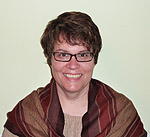 Committee member efforts. Former committee member Dr. Sharon Meagher organized a conference to discuss how to evaluate public or engaged scholarship in philosophy. The conference was cosponsored by the APA committee on Public Philosophy and the Center for Global Ethics at George Mason University, thanks to Dr. Andrew Light. Other fields have
already established some standards for this process and can serve as models for philosophers to follow. Dr. Meagher has begun work on the Public Philosophy Network (www.publicphilosophynetwork.org), which will serve as a social networking resource for public philosophers. According to Dr. Meagher, "Our plan right now is to use social networking hosting software that will allow us to have users network, form affinity groups, develop their own pages and blogs within the site." The idea for the Public Philosophy Network was a result of the conference she and Dr. Ellen Feder organized. The conference was called "Practicing Public Philosophy: Reflection and Dialogue," and took place on April 2, 2010. The Web site for the conference is here.
Committee member efforts. Former committee member Dr. Sharon Meagher organized a conference to discuss how to evaluate public or engaged scholarship in philosophy. The conference was cosponsored by the APA committee on Public Philosophy and the Center for Global Ethics at George Mason University, thanks to Dr. Andrew Light. Other fields have
already established some standards for this process and can serve as models for philosophers to follow. Dr. Meagher has begun work on the Public Philosophy Network (www.publicphilosophynetwork.org), which will serve as a social networking resource for public philosophers. According to Dr. Meagher, "Our plan right now is to use social networking hosting software that will allow us to have users network, form affinity groups, develop their own pages and blogs within the site." The idea for the Public Philosophy Network was a result of the conference she and Dr. Ellen Feder organized. The conference was called "Practicing Public Philosophy: Reflection and Dialogue," and took place on April 2, 2010. The Web site for the conference is here.
Dr. Meagher and Dr. Feder then collaborated with the help of Dr. Nancy Tuana to create a wonderful report on the results of the conference. The report, titled "Practicing Public Philosophy:
Report from a meeting convened in San Francisco on April 2, 2010," can be found in a browsable Web page here. Alternatively, you can download a PDF version of the file to your computer here.
![]()
 Learning from other fields. According to an email from Dr. John Dichtl,
Executive Director of the National Council on Public History:
Learning from other fields. According to an email from Dr. John Dichtl,
Executive Director of the National Council on Public History:
"Three ACLS member learned societies--National Council on Public History, American Historical Association, and Organization of American Historians--jointly issued a report this week [June of 2010] offering best practices for evaluating public or 'applied' scholarship. The report encourages higher education administrators and history departments to set policies that will reflect the great variety of historical practice undertaken by faculty members, especially as many colleges and universities already trumpet 'civic engagement.'
"When this issue was raised on the CAO list a year or so ago, others expressed interest in seeing the final report."
The report is available at http://ncph.org/cms/careers-training/#Promotion&Tenure
![]()
 Online Tools
Online Tools
The committee is in the process of exploring the use of a number of online tools for pursuing its mission. One of them not listed below is this Web site. In time, more functionality will be added and updates will be posted here. This section here will include details about the various online projects that the committee is developing. It is not intended to be an area for links alone. For that, visit the "Links" page.
![]()
 Public Philosophy Network. Former committee member Dr. Sharon Meagher has organized an online social networking system available here: PublicPhilosophyNetwork.org.
Public Philosophy Network. Former committee member Dr. Sharon Meagher has organized an online social networking system available here: PublicPhilosophyNetwork.org.
The purpose of the Public Philosophy Network (PPN) is to:
1) to create a democratized space where reflection on public philosophy can take place, that is, a space of mutual learning and support for publically engaged philosophers and those who wish to do publically engaged work in the field;
2) to support philosophers (and those in related fields) who do publically engaged work by providing them with the opportunity to cultivate networks of both mentors and peers engaged in work identifiable as "public philosophy"; and
3) provide a resource clearing house of information on public philosophy.
The Network invites philosophical discussion concerning the concept of public philosophy, the relationship between theory and practice, and related issues. Network members can host their blogs and share their own work, and suggest relevant resources on the site. The Network hosts discussion forums and provides other tools to promote discussion and provide practical assistance on how to develop and sustain work in all fields of public philosophy. Members can network with others who share their research interests and create virtual spaces that enable collaborative research. Groups and professional associations working on any area of philosophy that has a public focus or component are welcome to host their group’s pages—free of charge—on the site. The site features:
• Affinity groups (and the ability to create new ones) to enable philosophers to network with one another and their research partners and/or community based practitioners

• Virtual space for collaborative research
• Members’ pages featuring member blogs, publication postings, etc.
• Resources on public philosophy, an events calendar, and discussion forums on areas of shared concern
![]()
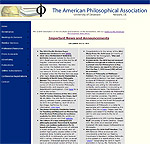 American Philosophical Association Web site. One of the great tools online that is available for philosophers and related to the Committee on Public Philosophy is the American Philosophical Association's own Web site. Some information listed there is free and open to the public. Other elements, such as a directory of members is reserved for members only. Associate Chair Dr. Eric Weber is in conversation with the APA's Executive Director, Dr. David Schrader, about potential enhancements to the APA's Web site for the purpose of growing opportunities and resources for non-APA members to learn about and get in touch with professional philosophers. Models are available already at many universities that have developed "expert databases," which are tools to help persons from the media as well as other interested non-university parties to find and get in touch with the right persons with expertise in areas of interest and importance for their concerns. If you know of a system that has worked exceptionally well for this process, feel free to contact Dr. Weber here: etweber@olemiss.edu.
American Philosophical Association Web site. One of the great tools online that is available for philosophers and related to the Committee on Public Philosophy is the American Philosophical Association's own Web site. Some information listed there is free and open to the public. Other elements, such as a directory of members is reserved for members only. Associate Chair Dr. Eric Weber is in conversation with the APA's Executive Director, Dr. David Schrader, about potential enhancements to the APA's Web site for the purpose of growing opportunities and resources for non-APA members to learn about and get in touch with professional philosophers. Models are available already at many universities that have developed "expert databases," which are tools to help persons from the media as well as other interested non-university parties to find and get in touch with the right persons with expertise in areas of interest and importance for their concerns. If you know of a system that has worked exceptionally well for this process, feel free to contact Dr. Weber here: etweber@olemiss.edu.
![]()
